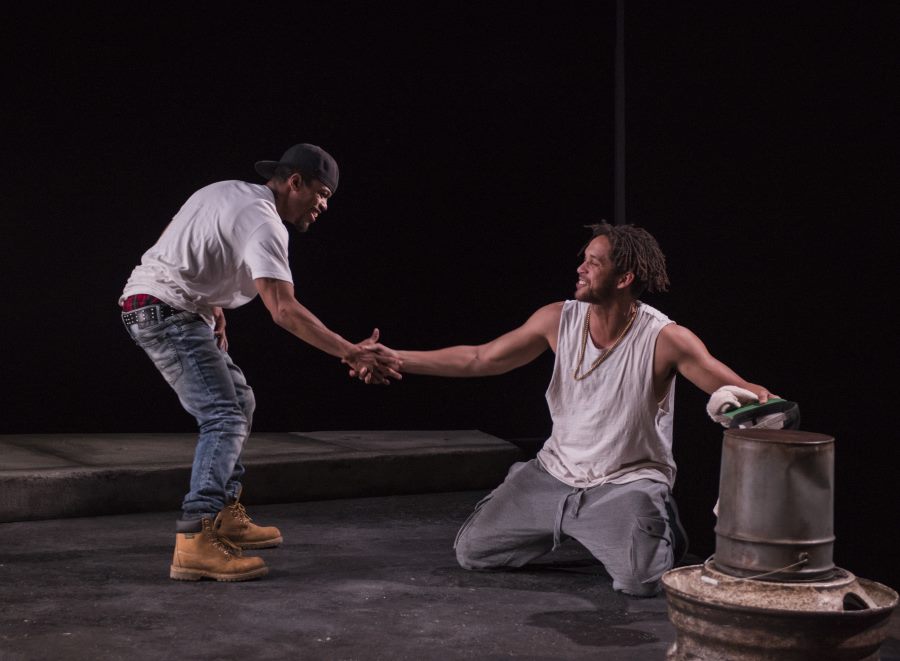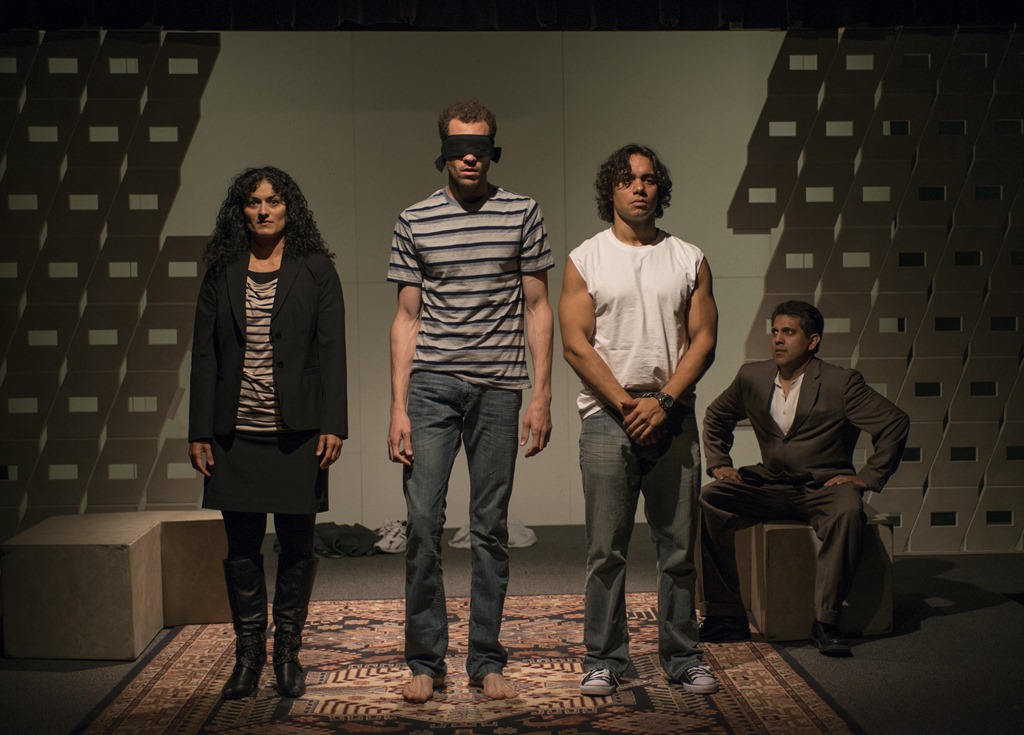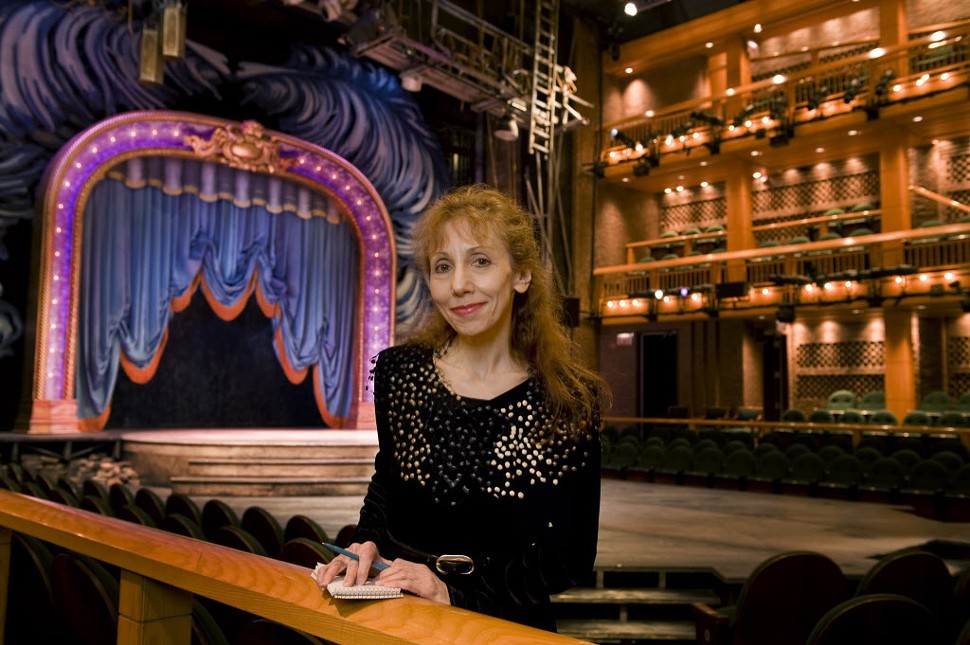It’s not every day that a theatre review is so controversial that it embroils not just the critic who wrote it but two newspapers and thousands of theatre artists and companies. But that’s just what happened when Hedy Weiss, critic for the Chicago Sun-Times, wrote a review of Pass Over, a play by Antoinette Nwandu, currently running at Steppenwolf Theatre Company. That review led to a Change.org petition calling for Chicago theatres to stop inviting Weiss to their shows. Within 24 hours, the petition had garnered 2,000 signatures (as of presstime, the number is up to 3,645).
Why the fuss? Pass Over, billed as a riff on Waiting for Godot, features two black men, sitting on a sidewalk, and it addresses issues of police brutality and institutionalized racism. In her June 13 review, Weiss praised the play’s artistic merits but took issue with its message. She wrote, in part:
To be sure, no one can argue with the fact that this city (and many others throughout the country) has a problem with the use of deadly police force against African-Americans. But, for all the many and varied causes we know so well, much of the lion’s share of the violence is perpetrated within the community itself. Nwandu’s simplistic, wholly generic characterization of a racist white cop (clearly meant to indict all white cops) is wrong-headed and self-defeating. Just look at news reports about recent shootings (on the lakefront, on the new River Walk, in Woodlawn) and you will see the look of relief when the police arrive on the scene.
Steppenwolf responded with a statement that Weiss’s “critical contribution has, once again, revealed a deep-seated bigotry and a painful lack of understanding of this country’s historic racism. Her contribution is actively working against the kind of theatre we are striving to be.” (Nwandu has written her own response here.)
The Change.org petition was launched on June 14 by an ad-hoc group of artists billing themselves the Chicago Theater Accountability Coalition. The petition said, in part:
Over the last few years especially, we have joined together to make it clear that inappropriate language or behavior does not have a place within our community, and that prejudice of any kind will not stand.
Hedy Weiss, theatre critic for the Chicago Sun-Times, has proven that she is not willing to work with us to create a positive environment. She has proven this repeatedly with the racism, homophobia, and body shaming found in her reviews. She has proven this by never, not once, apologizing to a party injured by her words.
The petition urges theatres to refuse Weiss free tickets to their shows, an industry standard for theatre critics. As both these statements indicate, this is hardly the first time she has stirred controversy, whether calling Tony Kushner a “self-loathing Jew” (in a 2004 review of Caroline, or Change), praising a recent production of In the Heights with a white lead actor in a role written as Dominican-American as having an “unusually ‘authentic’ cast,” or wondering aloud—in an infamous 2013 review of Jonas Hassen Khemiri’s Invasion!, a satire of anti-Arab hysteria—“What practical alternative to profiling would you suggest?”
But Weiss typically doesn’t engage with such criticisms, and would not comment for this story. In a 2015 speech at the American Theatre Critics Association, she explained her approach on this front: “Once you’re perceived as a target, well, the arrows do fly. And the only way to deal with this is to go and see the next play, which is what I do. The controversy comes with the territory.”

But last Friday, June 23, the Sun-Times printed an editorial defending Weiss, saying that the paper will pay for her theatre tickets if need be (most of the city’s larger theatres, while issuing statements of support for those taking issue with her review, did not sign on to the no-comps pledge). Wrote the Sun-Times editors: “What troubles so many of us in journalism, who live and die by the First Amendment’s right to free speech, is to see so many people in the theatre community, who also live and die by that right, falling in line to try to keep a critic from doing her job.” The op-ed concluded with the concession that the Sun-Times may “have room to grow when it comes to covering the diverse communities we serve, including in the arts. Our promise every day is to continue to do better. We do that, always, in the best of faith.”
But ChiTac organizers are adamant that they are not calling for a ban or an attack on free speech.
“Honestly, the First Amendment protects everyone’s free speech from government—there’s nothing in there that says a theatre critic must get a free ticket,” said playwright Ike Holter, a founding member of ChiTac. “This woman loves to have her opinion out there. We think that’s great.” For Holter, theatres who give free tickets to someone who engages in “hate speech” are thereby condoning it. “Literally the only thing is: We’re not going to subsidize it, we’re not going to become complicit in it. We’re going to ask for her to pay for her own ticket.”
For actor Sasha Smith, another ChiTac organizer, the issue isn’t that artists can’t handle criticism but that artists should not be asked to stand for bigoted remarks. “We can take a critique; we have our entire careers,” she said. “I think [reviewing] is a valuable part of being in this community.” But Smith said that as the Chicago theatre scene becomes more diverse, its artists should fight bigotry wherever it crops up. “To say, ‘This is how it goes, get over it’ is such a slap in the face to every single race, body, sexual orientation that has been discriminated against by this person. I think most of us spend our days being told just to get over it.”
According to ChiTac, since the petition was released around 60 theatres have made public statements in support. Silk Road Rising is one theatre that committed to refusing Weiss free tickets. The theatre is no stranger to controversy with the critic, as that’s where a production of Invasion! prompted Weiss’s comment about racial profiling (and an online edit by the Sun-Times).
Silk Road Rising artistic director Jamil Khoury admitted that while Weiss has given his company’s shows positive reviews over the years, he objects to her racially divisive language.
“There’s been a history of editorializing and using her position and her platform and her power to advance a political agenda that has harmed a number of artists over the years,” Khoury explained, noting that many of his artists have expressed concerns about Weiss. “She doesn’t pull back from ascribing racialized and often racist stereotypes or assumptions about artists and characters of certain backgrounds. We’re talking about communities of color, we’re talking about directing people to be fearful of black people, Muslims, immigrants—a great deal of other-izing that goes into her work.”
After a long record of these instances—to which might be added the report, confirmed by several witnesses, that on a public panel in 2011 she said, “there are so many plays about race and gender that it’s sickening”—the Pass Over review was the straw that broke the camel’s back. Coming in the same week in which the police officer who shot Philando Castile was acquitted, the review and its aftermath felt like a particularly painful blow. “This is a very sensitive time in America, and when someone says that the people who are suffering are nothing, a lot of people instantly got very upset,” said ChiTac’s Holter.
Weiss’s most prominent peer, Chicago Tribune theatre critic Chris Jones, was happy to talk about where he differed with her. “Only a fool in this city doesn’t know the problems with the police,” Jones said. “They’re devastating issues, and this play is a powerful indictment of murderous police officers. All of that is absolutely legitimate. When Hedy says, ‘This de-legitimates the play,’ I couldn’t disagree more.”
But despite his dissent, Jones was vocal about Weiss’s right as a critic to make those statements (as is his own paper, which published an editorial last week in support of Weiss).
“I support the notion of a critic to express themselves and to have a viewpoint, even a conservative viewpoint that many people find offensive,” Jones said adamantly. “I believe strongly that exercising that right is good for Chicago theatre. If you have no independent voices, if you have no counter-narrative to the prevailing narrative, the theatre ends up talking to itself.” He noted that there are many, including presumably many of Weiss’s readers, who agree with her that black-on-black crime is the real issue. “That opinion is not different from what you’d find on Fox News; it’s in what I would describe as mainstream conservative thought.”
While artists like Khoury agree that Weiss has the right to her opinions, he insisted that those offended by her reviews have a right to respond. “If we’re going to talk about speech, we have to allow for the speech of those who have been injured by her reviews over the years,” he said. “There’s a price for speech. I don’t know of any speech that doesn’t come with a price, and so the price that we’re asking for is the price of a ticket.”

The no-comp policy advocated by ChiTac seems to have divided Chicago theatres. While smaller companies—the Gift Theatre, About Face Theatre, First Floor Theater, Steep Theatre Company, and Silk Road Rising—have been vocal about refusing Weiss free tickets, larger houses haven’t signed on. Writers Theatre, Steppenwolf, and the Goodman Theater, for instance, all released strong statements supporting diversity and inclusion and acknowledging the pain caused by insensitive criticism, while affirming that they would not refuse comps to any critics.
Victory Gardens artistic director Chay Yew said that his theatre hasn’t settled on an official policy, but did indicate that “both of our next season playwrights so far, Tanya Saracho and Antoinette Nwandu, do not wish to offer free tickets to Hedy, but are open to have Hedy review their plays if she desires.”
No matter their position on reviewer comps, everyone interviewed for this story agreed the following are paramount to the future of criticism: more diverse theatre critics, better dialogue between critics and those they critique, and more frank discussions about institutionalized racism and unconscious bias.
Jackie Taylor, artistic director of the Black Ensemble Theater, is starting with the latter. She is planning on organizing a town hall, and inviting theatre artists, critics, and audiences (Steppenwolf is also in support of the idea). And she will continue to invite Weiss to her theatre’s shows, noting that Weiss has not been the only theatre critic in Chicago, or nationally, who has made problematic statements in their reviews.
“I don’t think the answer is disinviting Hedy,” Taylor said. “That does not deal with the issue; the issue is racism.” The key, she said, is to keep dialogue going and the line of communication open, and she feels that Chicago is more than up to the task. “I think Chicago is way ahead of any other place in terms of the strength, the intelligence, the recognition of who and what and where we are as a society,” Taylor said. “I think the Chicago theatre community has shown strength in bringing this issue into awareness, and responding and reacting. And I think because of that, we’re in a better place.”


